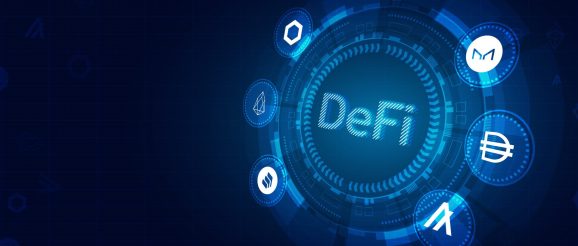Revolutionizing Finance Innovation with Blockchain and DeFi

There is a revolution happening in the current financial landscape, driven by the emergence of decentralized finance and the utilization of blockchain technology. In April 2023, the total value locked in decentralized finance exceeded $150 billion, and global blockchain spending is forecast to hit $19 billion by 2024. This transformative shift is giving rise to a new era of financial innovation, challenging established norms, and fundamentally reshaping how individuals and institutions interact with financial systems. Decentralized Finance : A New Paradigm Decentralized Finance : A New Paradigm
Decentralized finance (DeFi) is a new financial paradigm that leverages blockchain technology to create financial ecosystems that operate independently of traditional intermediaries, including banks and insurance companies. It is driven by open finance, meaning anyone with an internet connection and a compatible device can access and participate in the DeFi ecosystem, regardless of location, identity, or credit history. This can empower people currently excluded or marginalized by the traditional financial system, such as the unbanked, the underbanked, or the oppressed. It can also offer users more choices and opportunities to manage their finances, because they can customize their preferences and risk profiles according to their needs and goals. At the center of this revolution lies the application of smart contracts on blockchain networks, automating financial transactions to enhance speed, efficiency, and transparency. The potential of DeFi is profound, particularly in its capacity to democratize access to financial services, thereby bridging gaps for individuals currently underserved in traditional financial institutions. Blockchain: The Heart of Decentralized Finance Blockchain: The Heart of Decentralized Finance
Blockchain technology serves as the core of the DeFi revolution, enabling the creation of various financial products and services that do not rely on intermediaries or centralized authorities. Lending platforms, stablecoins, exchanges, and insurance are collectively known as DeFi applications or protocols, which run on self-executing agreements (smart contracts) encoded on the blockchain and triggered by predefined conditions. By using blockchain technology, DeFi aims to ensure transparency and fortify security, as all transactions are publicly verifiable and tamper-proof once recorded. It also offers more opportunities for innovation, as anyone can create and participate in DeFi protocols without censorship. Eliminating intermediaries that take a cut means DeFi users get higher returns, lower fees, and great control over their assets. Beyond its role in DeFi, the versatility of blockchain technology is evident in its application across various sectors, from supply chain management to healthcare, showcasing its potential for widespread adoption. The Intersection of DeFi and Blockchain The Intersection of DeFi and Blockchain
The combination of DeFi and blockchain has led to the development of innovative solutions that challenge traditional finance. Today, users are empowered by harnessing the transparency, security, and decentralization of blockchain technology and the accessibility and automation of DeFi. One example of how DeFi and blockchain can create a better financial system is through lending platforms. These platforms allow users to lend and borrow money directly from each other without going through a bank or a middleman. This way, users earn higher interest rates, pay lower fees, and access funds more easily. Another example is insurance platforms, which enable users to pool their money and share the risk of common events, such as natural disasters or accidents. Here, users get cheaper and faster insurance without relying on a company or an agent. The Future of Finance is Here The Future of Finance is Here
Looking ahead, the trajectory of finance appears promising with the continued evolution of DeFi and blockchain technologies. As these innovations mature, the financial landscape is poised to witness the emergence of even more ingenious solutions that challenge the established order and expand access to financial services. However, it is crucial to acknowledge that this field is still in its infancy with challenges such as regulatory hurdles and technical issues. Collaboration and open dialogues among stakeholders, as exemplified at events like a blockchain conference, are critical to addressing these concerns and ensuring the sustainable growth of this burgeoning sector. DeFi and blockchain epitomize a new frontier in financial innovation. Their integration has the promise to craft a financial system that is not only more inclusive but also more efficient and transparent. The decentralized future of finance is not a distant vision—it is here, transforming the financial landscape and paving the way for a more accessible and equitable financial ecosystem. As these technologies continue to mature and overcome challenges, the financial industry stands on the cusp of a revolution that has the potential to redefine the very nature of how we perceive and engage with finance.
